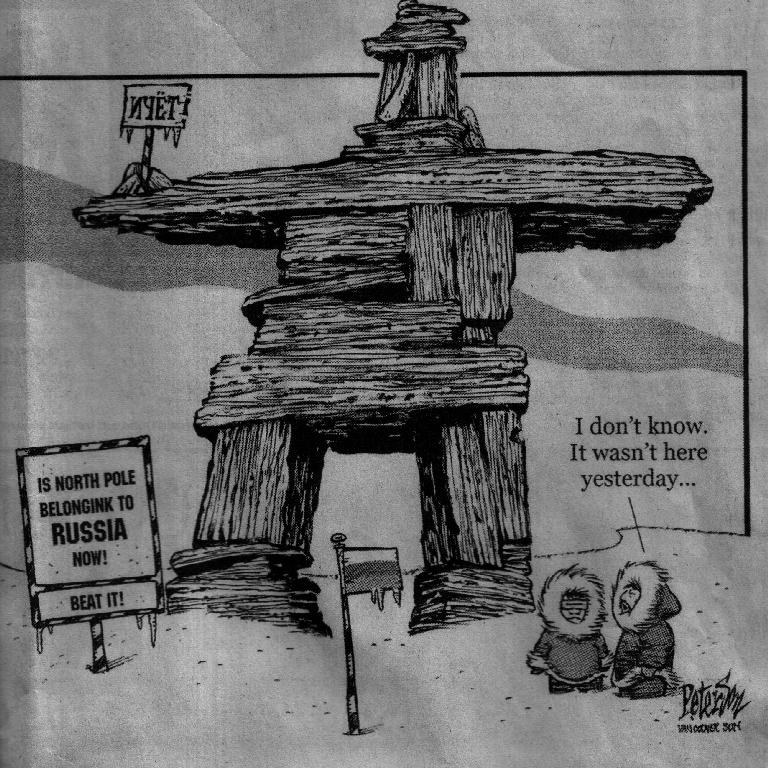July 26, 2007
Pseudo-Cyrillic
This cartoon on the editorial page of today's Vancouver Sun is linguistically interesting. Look at how the word "no" on the sign held by the inukshuk is written.

The sign ичёт makes no sense if one actually reads Russian, in which it would be pronounced /itʃot/, which as far as I know means nothing at all. It is evidently intended to be read as /njet/ "no". The letter и is like an <N>, the ч is similar to a <Y>, the ё is an <E> with a diacritic that means nothing in English but makes the word look Cyrillic, and of course the т closely resembles a <T>. The actual Russian spelling is: нет.
The author presumably assumed that Canadian readers would know the Russian word for "no" but would not be able to read Cyrillic letters. These are probably correct assumptions. That people who otherwise know no Russian can be expected to know the word for "no" is an interesting relic of the Cold War. I don't think that is true of other languages. People who have studied a language a bit are likely to learn and retain the word for "no", but I suspect that Russian and German (because of all those movies about WW II) are the only languages whose word for "no" can be assumed to be known by people who have never studied them. People who know only a few words of Chinese or Arabic or Italian tend to know things like the names of foods and how to say "hello", but not "no".
Addendum 2007-07-28: A couple of readers have raised the possibility that the Russian letters are intended to spell a Russian word in Cyrillic. The hypothesis is that the intended word is учёт /utʃot/, literally "inventory". This word is often used in Russian stores as a shorthand for "closed for inventory". During the Soviet period workers in stores did not care about sales or customer service, so they would take inventory during regular business hours and put up the "(closed for) inventory" sign whenever they felt like it. As a result, it now has the connotation "Fuck off, you're not welcome here.".
It isn't trivial to decide what the intention of the cartoonist was. The Russian speakers who have written are divided as to the appropriateness of "inventory" in this context. One says that it is not appropriate since the Arctic is not a store; for the other this apparently doesn't matter. The fact that the "inventory" interpretation requires an error in the first letter argues in favor of the "no" hypothesis but is hardly conclusive. What leads me to continue to favor my original interpretation is that the cartoon is directed to a readership most of whom have no Russian to speak of. They can be assumed to know the word "nyet", but can hardly be expected to know "inventory", much less its Soviet-era connotation. It is not out of the question that the cartoon is even cleverer than it seems and that the cartoonist knows Russian and had both interpretations in mind. The cartoonist, Roy Eric Peterson, is quite well known, but I have no information regarding his knowledge of languages. Since he was born in 1936 he did grow up during a time in which, due to the Cold War, it was more common than it is now for high school and college students to study Russian, but I have no idea if he actually did.
Posted by Bill Poser at July 26, 2007 10:38 PM